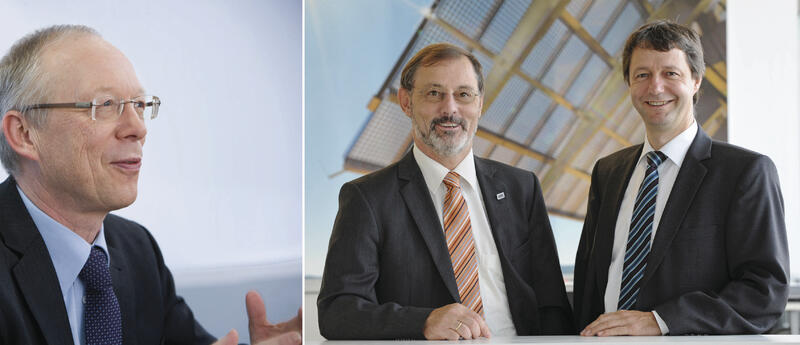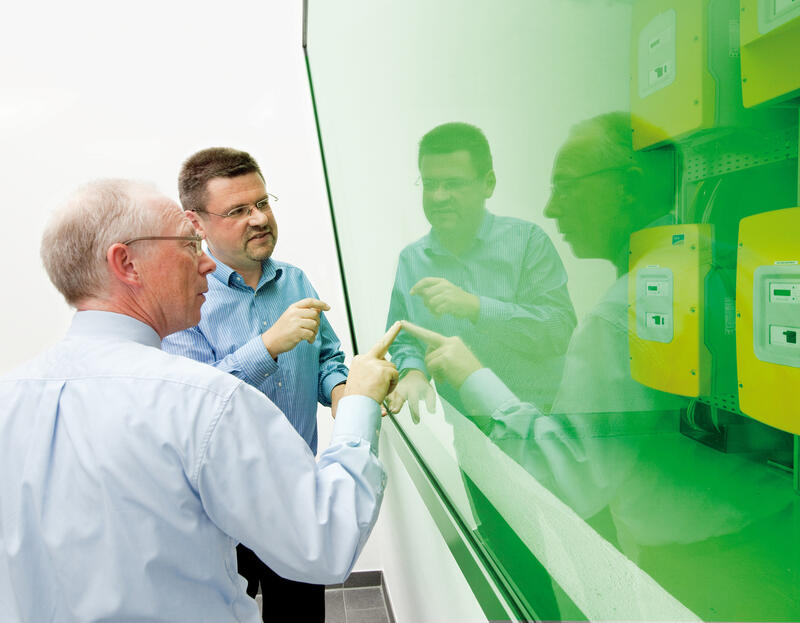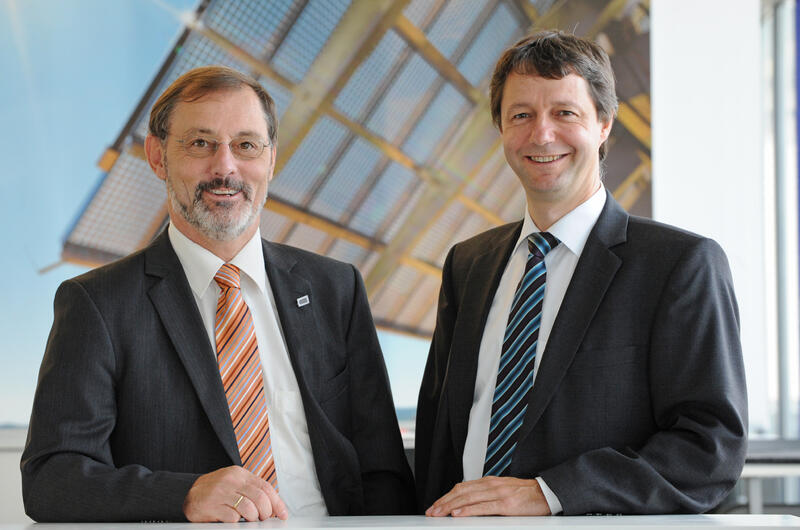Photovoltaic technology from Germany leads the world
Osnabrück. The winners of the German Environmental Award of the Deutsche Bundesstiftung Umwelt (DBU) have been selected. The award, at 500,000 euros the most lucrative environmental prize in Europe, will be shared in 2012 by the co-founder and supervisory board chairman at SMA Solar Technology AG (Kassel), Günther Cramer (59), and the researcher/entrepreneur team Dr. Andreas Bett/Hansjörg Lerchenmüller (both Freiburg). Bett (50) is the deputy director of the Fraunhofer Institute for Solar Energy Systems (ISE), while Lerchenmüller (45) is CEO of Soitec Solar GmbH. “With their pioneering technological developments and personal commitment,” the prizewinners have “set worldwide standards in photovoltaics and thus significantly advanced the field at a global level,” as DBU Secretary General Dr. Fritz Brickwedde put it today: “We have to lead the world technologically in research, development and innovation. Then we will also be economically successful.” The prizes will be presented in Leipzig on 28 October by German President Joachim Gauck.
Solar inverters lead globally with 99 percent efficiency
Brickwedde said that by focusing consistently on research and development, Cramer, together with co-founders Peter Drews and Reiner Wettlaufer, had succeeded in turning the SMA from a small engineering consultancy into a globally active technology and market leader employing more than 5,500 people. He described how Cramer's company had cut a niche for itself with its highly innovative solar inverters, which convert the direct current from photovoltaic systems into alternating current suitable for grid use and increasingly also had to manage the highly complex tasks involved in integrating solar current into power grids. He said SMA had made a major technological contribution to the success of photovoltaics (PV) and to reducing costs by developing the string technology, which was introduced in 1996 with the “Sunny Boy” inverters, by simplifying installation and maintenance procedures, and by increasing the efficiency of the inverters to the extremely high level of 99 percent using a series of new high-performance electronic solutions. Today, according to Brickwedde, SMA inverters were the intelligent nerve centre of a PV array, allowing an optimal integration of solar current into grids. Cramer and his team had paved the way to SMA's success by developing the “Sunny Boy” series of inverters, he said.

© Fraunhofer ISE/Soitec/DBU
"Sunny Island" provides developing countries with green energy
Brickwedde went on to praise the fact that Cramer had always pursued his vision of promoting renewable energies in developing and emerging nations, where more than 1.3 billion people were still without access to electricity. He said SMA had, on the basis of many years of experience, developed the battery/inverter system “Sunny Island”, which makes a modular off-grid electricity supply possible in rural areas. Photovoltaic systems, wind farms or hydro-electric plants could be connected to this stand-alone grid, depending on the kind of energy available locally, he said, adding that thousands of stand-alone grids had already been set up in many developing countries on the basis of “Sunny Island” concepts.
Charitable projects in which SMA staff had set up PV systems and stand-alone grids in healthcare centres or schools
Brickwedde also mentioned charitable projects in which SMA staff had set up PV systems and stand-alone grids in healthcare centres or schools in countries such as Uganda and Madagascar, thus enhancing the quality of life for local residents. In 2011, he said, Cramer, together with SMA co-founders Drews and Wettlaufer, had established three foundations with which they wanted to develop and support concepts and business models for promoting PV-based decentralised stand-alone systems. In addition, Cramer had worked intensively for many years on making the region of northern Hesse a centre for renewable energy sources, Brickwedde said. He added that, as president of the German Solar Industry Association, Cramer had pursued his goal of promoting both the PV industry in Germany and the expansion of photovoltaics as a whole with great commitment.
Corporate culture: employee participation and innovative building technology
Brickwedde commended how Cramer had always attached great importance to a cooperative style of company leadership, in which employees were involved in information and decision-making processes and had a financial share in the company's success. Using sustainable energy concepts in SMA's own buildings was also an important principle for Cramer, Brickwedde said – for example, in the world's largest solar inverter factory, which operated with a carbon-neutral power supply and energy-efficiency technology. Brickwedde: “Cramer has devoted his professional life to the cause of renewable energy sources. With his ecological and social engagement, he lives out his vision of making possible a shift to a 100 percent decentralised energy supply from renewable sources, making him a great example to other companies.”

© SMA Solar Technology AG
Concentrator solar cells twice as effective as conventional technology
Speaking about the other prizewinners, Bett and Lerchenmüller, Brickwedde said they were “living proof of the successful interaction between scientific excellence and business enterprise. Together, they have successfully travelled the long path from vision to industrial product. With their concentrator technology, which can use sunlight far more effectively than conventional silicon modules by employing high-efficiency multi-junction solar cells and special collector lenses, they have set unprecedented standards in photovoltaics.” This technology currently allowed module efficiency of around 30 percent, according to Brickwedde, an energy yield that is about twice as large as with conventional silicon technology.
A testament to how the technology transfer from research to industry can succeed
Brickwedde went on to describe how the concentrator technology had been significantly influenced by the Fraunhofer ISE, for which Bett had carried out research on solar cells since 1987. At this time, he said, Lerchenmüller had been in charge of profitability, market and technology analyses at the ISE, and had the task of assessing the chances for success of the projects on which his colleagues were working. Convinced by the potential of this new technology, in 2005 Lerchenmüller took a position as CEO of the start-up enterprise Concentrix – now Soitec Solar – which was founded by the ISE, and began to make the concentrator PV modules ready to go into production. Brickwedde: “The story of these two inventors is a testament to how the technology transfer from research to industry can succeed and new, qualified jobs can be created.

© Fraunhofer ISE/Soitec
Germany needs to produce "researchers, engineers, technicians and inventors who are ready to take risks."
While announcing the prizewinners, Brickwedde also mentioned the economic problems facing PV production in Germany caused by dumping prices of Chinese competitors. However, he said this did not mean there was a general crisis in solar energy throughout the world. He also said that the transition from fossil fuels to renewable energy sources was not just a national issue for Germany, but should be seen as a global project in which southern European and North African countries, with their intense and continuous sunlight, were important partners. To promote this joint project, he said, Germany needed to produce “researchers, engineers, technicians and inventors who are ready to take risks.” Brickwedde: “If we want to move more towards renewable energy sources worldwide, we need the most modern, the best and the most innovative environmental technology from Germany.” The winners of the 2012 Environmental Award had proven that successful international marketing and a “symbiosis of ecology and economy” were possible with top German environmental technology, he said.
The most lucrative environmental prize in Europe
The German Environmental Award of the DBU is an independent award that at 500,000 euros is the most lucrative environmental prize in Europe. It is being presented in 2012 for the 20th time. Its purpose is to recognise achievements constituting an exemplary contribution to the protection and preservation of the environment or that will contribute to reducing the strain on the environment in some major way in the future. It goes to individual people, companies and organisations. The prize can be awarded for projects, particular environmental measures or a person's lifetime achievements. Candidates for the German Environmental Award are nominated to the DBU. Employer associations and unions, churches, environmental and nature conservation associations, scientific societies and research communities and trade and business associations are among those eligible to make such nominations. Self-nominations are not allowed. A jury appointed by the DBU Board of Advisors, consisting of independent and outstanding experts from business, science, technology and social groups, recommends prizewinners for the respective year to the Board. The Board then takes the final decision.